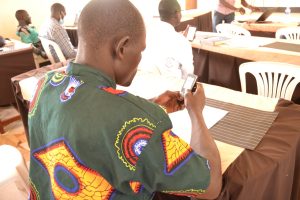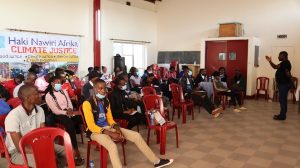
All eight of the Social Innovation Challenge( SIC) 2021/21 winners are currently implementing their scale-up projects, having received $8,000 for research and design support to help in their work.
They are scaling innovative solutions that are technology-related, policy-relevant, related to research, or advocacy in response to the COVID 19 pandemic.
To get an insight into their work in this month’s edition of the newsletter, we feature three of the eight winners.
Over the past month, Community Media Network Uganda, with support from I4C-Africa Hub, has developed and prototyped a Short Message Service (SMS) platform application that handles public service complaints.
The project’s main objective is to employ digital technologies to enhance public service delivery in light of the COVID-19 pandemic, which threatens to disrupt service delivery for thousands of people.
Overall, the project aims to improve transparency and accountability in the service delivery framework.
Since the project kick-off in Apac, Kole, Oyam, and Lira districts, the toll-free SMS application has registered increasing complaints reported to the public institutions, and it’s expected the platform will enable the government to respond more quickly and efficiently.
The user-friendly platform, which has multilingual features, will benefit, both directly and indirectly, 5,000 people.
To raise awareness levels of the SMS platform,COMNETU conducted training workshops to bridge the rural digital gender gap between women and men to achieve rural digital gender equality.

The user-friendly platform, which has multilingual features, will benefit, both directly and indirectly, 5,000 people. © COMNETU.
Additionally, on 22 October 2021, COMNETU participated in a local radio talk show to create awareness about the application.
Apart from the application creating a forum for citizen engagement with their local government, it also provided a platform to engage with Civil Society Organizations, the private sector, media, and other stakeholders.
Meanwhile, as part of efforts in addressing shrinking civic spaces in institutions of higher learning, human rights, and social justice promotion organization, Haki Nawiri Afrika on 21 October 2021, conducted a two-day human rights education training for 80 participants drawn from Nairobi County.
The training brought together students and community members to discuss how to address human rights violations, build their capacity on paralegalism, psycho-social support, student-police dialogue, and other topical issues.

With the support of I4C- Africa Hub, similar training forums will be held in neighboring Machakos county. © Haki Nawiri.
The training sessions come against the backdrop of increasing violations of student rights both within and outside learning institutions in the two countries.
Additionally, the project seeks to respond to the rising cases of rights violations, mainly due to the COVID-19 pandemic, of which the most vulnerable are youth and women.
The institutions that took part in the training included Kenyan Peasants League, Ibon International, Eastern Africa Child Rights Network, Dandora Social Justice Centre (DSJC), community members, and students from Kenyatta, Daystar, Kiriri, Catholic, and Nairobi universities.
On the other hand, Uganda-based Non-Government Organization Legal Hub Uganda is currently facilitating online interviews hosting various experts to offer their legal opinion on how Ugandans can navigate some of the challenges in the wake of COVID 19.
The main objective of the 30-minute weekly television programme is to empower citizens to defend and reclaim their rights through reporting land conflicts, child abuse, gender-based violence, and other human rights violations, which become rampant following the outbreak of the COVID-19 pandemic.
In partnership with an online TV channel, House of Talent T, Legal Hub Uganda has produced four of 12 episodes that have mainly focused on the implication of COVID19 on human rights.